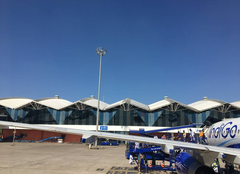Sulabh Complex Visiting Hours, Tickets, and Travel Tips in Indore, India
Date: 19/07/2024
Introduction to Sulabh Complex
The Sulabh Complex in Indore, India, stands as a monumental achievement in the field of public sanitation and social reform. Established by the Sulabh International Social Service Organisation, founded by the visionary Dr. Bindeshwar Pathak in 1970, the complex is more than just a facility for public convenience. It is an embodiment of the organization’s mission to promote human rights, environmental sanitation, and social reforms. Dr. Pathak’s pioneering efforts have not only addressed the critical sanitation crisis that plagued India in the 1970s but also set a model for sustainable sanitation solutions that have been replicated across the country. The complex in Indore, established in the 1980s, showcases the revolutionary Sulabh Shauchalaya system, which uses twin-pit pour-flush toilet technology, providing an affordable and environmentally friendly solution to sanitation. This guide provides a comprehensive overview of the Sulabh Complex, including its historical significance, visiting hours, ticket information, and travel tips, ensuring that visitors have all the necessary information for a meaningful visit.
Table of Contents
- [Introduction](#introductionintroduction-to-sulabh-complex)
- [Origins and Establishment](#origins-and-establishmentorigins-and-establishment)
- [Early Developments](#early-developmentsearly-developments)
- [Expansion and Impact](#expansion-and-impactexpansion-and-impact)
- [Government Collaboration](#government-collaborationgovernment-collaboration)
- [Social and Cultural Impact](#social-and-cultural-impactsocial-and-cultural-impact)
- [Technological Innovations](#technological-innovationstechnological-innovations)
- [Recognition and Awards](#recognition-and-awardsrecognition-and-awards)
- [Visitor Information](#visitor-informationvisitor-information)
- [Visiting Hours](#visiting-hoursvisiting-hours)
- [Tickets](#ticketstickets)
- [Location](#locationlocation)
- [Nearby Attractions](#nearby-attractionsnearby-attractions)
- [Accessibility](#accessibilityaccessibility)
- [Architectural Design and Features](#architectural-design-and-featuresarchitectural-design-and-features)
- [Social Impact](#social-impactsocial-impact)
- [Educational Initiatives](#educational-initiativeseducational-initiatives)
- [Visitor Experience](#visitor-experiencevisitor-experience)
- [Community Engagement](#community-engagementcommunity-engagement)
- [Environmental Benefits](#environmental-benefitsenvironmental-benefits)
- [Challenges and Future Prospects](#challenges-and-future-prospectschallenges-and-future-prospects)
- [Best Time to Visit](#best-time-to-visitbest-time-to-visit)
- [Dress Code and Etiquette](#dress-code-and-etiquettedress-code-and-etiquette)
- [Local Cuisine](#local-cuisinelocal-cuisine)
- [Safety Tips](#safety-tipssafety-tips)
- [Transportation](#transportationtransportation)
- [Accommodation](#accommodationaccommodation)
- [Cultural Insights](#cultural-insightscultural-insights)
- [FAQ](#faqfaq)
- [Conclusion](#conclusionconclusion)
- [References](#referencesreferences)
Origins and Establishment
The Sulabh Complex in Indore is part of a broader initiative by Sulabh International, founded by Dr. Bindeshwar Pathak in 1970. The organization was established to address various social issues through education and sustainable solutions. The Sulabh Complex in Indore provides accessible and hygienic sanitation facilities to the public, reflecting these goals.
Early Developments
In the early 1970s, India faced a significant sanitation crisis, leading to widespread open defecation and severe health risks. Dr. Pathak’s vision was to address these issues through affordable and sustainable solutions. The first Sulabh Complex was established in Patna, Bihar, and its success led to the replication of the model in various parts of India, including Indore.
Expansion and Impact
The Sulabh Complex in Indore was established in the 1980s as part of the organization’s expansion efforts. The complex was designed to provide clean and safe public toilets, particularly in urban areas where sanitation facilities were scarce. The introduction of the Sulabh Shauchalaya system revolutionized sanitation in India, using twin-pit pour-flush toilet technology that is both cost-effective and environmentally friendly.
Government Collaboration
The success of Sulabh Complexes led to collaborations with the Indian government to improve sanitation across the country. In Indore, the local municipal corporation partnered with Sulabh International to establish and maintain public toilets, making Indore one of the cleanest cities in India.
Social and Cultural Impact
The Sulabh Complex in Indore has significantly improved the quality of life for many residents, especially women and children, by providing safe sanitation facilities. It has also played a crucial role in breaking the taboo surrounding sanitation and promoting hygiene through educational programs and awareness campaigns.
Technological Innovations
Over the years, the Sulabh Complex in Indore has seen several technological advancements, such as solar-powered lighting and water heating systems, and biogas plants that convert human waste into energy. These innovations make the complex a model for sustainable sanitation solutions.
Recognition and Awards
The Sulabh Complex in Indore has received numerous accolades for its contributions to sanitation and public health. Dr. Bindeshwar Pathak has been honored with several national and international awards, including the Padma Bhushan, one of India’s highest civilian awards.
Visitor Information
Visiting Hours
The Sulabh Complex in Indore is open daily from 6:00 AM to 10:00 PM, making it convenient for both locals and tourists to visit.
Tickets
Entry to the Sulabh Complex is generally free, but donations are welcome to support the maintenance and expansion of these facilities.
Location
The complex is centrally located in Indore, making it easily accessible by public transport and private vehicles.
Nearby Attractions
While visiting the Sulabh Complex, you can also explore other historical sites in Indore such as Rajwada Palace, Lal Bagh Palace, and the Central Museum.
Accessibility
The complex is designed to be accessible to people of all abilities, with ramps and handrails in place.
Architectural Design and Features
The Sulabh Complex in Indore is designed with user convenience and environmental sustainability in mind. The complex features separate sections for men and women, ensuring privacy and safety. Each section is equipped with multiple toilet stalls, urinals, and handwashing stations. The design incorporates natural ventilation and lighting to reduce energy consumption. Additionally, the complex uses eco-friendly materials and construction techniques to minimize its environmental footprint.
Social Impact
The Sulabh Complex has had a profound social impact on the local community in Indore. By providing accessible and hygienic sanitation facilities, the complex has significantly improved public health outcomes. The availability of clean toilets has reduced the incidence of waterborne diseases and improved overall hygiene standards. Furthermore, the complex has created employment opportunities for local residents, particularly women, who are employed as attendants and maintenance staff.
Educational Initiatives
In addition to providing sanitation facilities, the Sulabh Complex in Indore also serves as an educational hub. The complex hosts regular workshops and training sessions on hygiene practices, waste management, and environmental conservation. These initiatives aim to raise awareness about the importance of sanitation and encourage community participation in maintaining public hygiene. The educational programs are particularly targeted at school children, ensuring that the next generation is well-informed about sanitation issues.
Visitor Experience
Visitors to the Sulabh Complex can expect a clean, safe, and user-friendly environment. The complex is open 24/7, ensuring that sanitation facilities are available at all times. Signage within the complex is clear and informative, guiding users on how to use the facilities properly. The complex is also wheelchair accessible, making it inclusive for people with disabilities.
Community Engagement
The Sulabh Complex actively engages with the local community through various outreach programs. These programs include health camps, cleanliness drives, and awareness campaigns on sanitation and hygiene. The complex also collaborates with local schools and community organizations to promote the importance of sanitation. By fostering a sense of community ownership, the Sulabh Complex ensures that the facilities are well-maintained and respected by users.
Environmental Benefits
The Sulabh Complex in Indore is a model of environmental sustainability. The use of the two-pit pour-flush toilet system not only conserves water but also reduces the environmental impact of waste disposal. The biogas generated from waste is a renewable energy source, reducing the complex’s reliance on conventional energy sources. Additionally, the complex incorporates rainwater harvesting systems to further conserve water resources. For more information on the environmental benefits, refer to Sulabh’s Environmental Initiatives.
Challenges and Future Prospects
Despite its success, the Sulabh Complex faces several challenges. Maintenance of the facilities requires continuous funding and community cooperation. Vandalism and misuse of the facilities are also ongoing issues. However, the Sulabh International Social Service Organisation is committed to addressing these challenges through regular maintenance, community engagement, and technological upgrades. The future prospects for the Sulabh Complex include expanding its reach to more urban and rural areas, incorporating advanced sanitation technologies, and enhancing community participation.
Best Time to Visit
The optimal time to visit the Sulabh Complex in Indore is during the cooler months from October to March. During this period, the weather is pleasant, making it ideal for exploring the site comfortably. The temperatures range from 10°C to 25°C, which is perfect for outdoor activities. Avoid visiting during the summer months (April to June) when temperatures can soar above 40°C, making it uncomfortable for sightseeing.
Dress Code and Etiquette
Visitors are advised to dress modestly and comfortably. Light cotton clothing is recommended during the warmer months, while a light jacket or sweater may be necessary during the cooler months. Since the complex includes areas of historical and cultural significance, it is important to maintain decorum and respect the site. Photography is generally allowed, but it is courteous to ask for permission before taking pictures of specific exhibits or individuals.
Local Cuisine
Indore is famous for its street food, and a visit to the city is incomplete without sampling some local delicacies. Sarafa Bazaar and Chappan Dukan are popular food streets where you can enjoy a variety of snacks such as poha, jalebi, samosas, and bhutte ka kees. These food streets are located within a 10 km radius of the Sulabh Complex.
Safety Tips
While Indore is generally safe for tourists, it is always wise to take basic precautions:
- Keep your belongings secure and be mindful of pickpockets in crowded areas.
- Stay hydrated, especially during the warmer months.
- Use reputable transportation services and avoid traveling alone late at night.
- Follow local COVID-19 guidelines, including wearing masks and maintaining social distancing.
Transportation
Indore is well-connected by air, rail, and road. The Devi Ahilya Bai Holkar Airport is about 12 km from the Sulabh Complex and offers regular flights to major cities in India. Indore Junction is the main railway station, located approximately 8 km from the complex. Local transportation options include auto-rickshaws, taxis, and app-based cab services like Ola and Uber. Public buses operated by the Indore City Transport Service Corporation (ICTSL) are also available.
Accommodation
There are numerous accommodation options near the Sulabh Complex, ranging from budget hotels to luxury resorts. Some recommended options include:
- Radisson Blu Hotel: A luxury hotel located about 10 km from the complex, offering modern amenities and excellent service.
- Hotel Shreemaya: A mid-range hotel situated approximately 8 km away, known for its comfortable rooms and good food.
- Zostel Indore: A budget-friendly hostel located around 7 km from the complex, ideal for backpackers and solo travelers.
Cultural Insights
Indore is a city rich in culture and history. The Sulabh Complex itself is a testament to the city’s commitment to social reform and public health. Visitors can gain insights into the efforts made towards improving sanitation and hygiene in India. Additionally, the complex often hosts educational programs and workshops aimed at raising awareness about sustainable practices and environmental conservation.
FAQ
What are the visiting hours for Sulabh Complex in Indore?
The Sulabh Complex is open daily from 6:00 AM to 10:00 PM.
How much do tickets to the Sulabh Complex cost?
Entry is generally free, but donations are welcome.
Is Sulabh Complex accessible for people with disabilities?
Yes, the Sulabh Complex is designed to be accessible to all visitors, including those with disabilities. Ramps and wheelchair-accessible pathways are available throughout the site.
Conclusion
The Sulabh Complex in Indore stands as a beacon of sustainable sanitation and social reform. Its innovative design, technological advancements, and community-centric approach have made it a model for similar initiatives across India and beyond. By addressing the critical issue of sanitation, the Sulabh Complex not only improves public health but also empowers communities and promotes environmental sustainability. For further reading on the impact and future plans of Sulabh International, visit their official website.
References
- Sulabh International Social Service Organisation. (n.d.). About Us. Retrieved from https://www.sulabhinternational.org/
- Sulabh International Social Service Organisation. (n.d.). Technology. Retrieved from https://www.sulabhinternational.org/technology/
- Sulabh International Social Service Organisation. (n.d.). Environmental Initiatives. Retrieved from https://www.sulabhinternational.org/environment/

